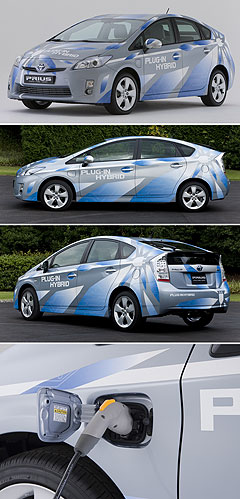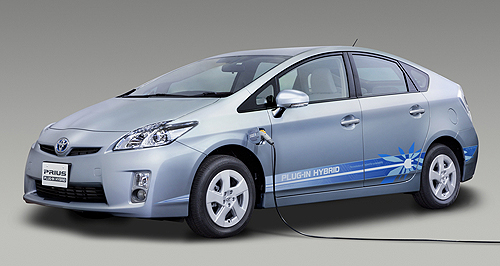Future models - Toyota - Prius - PHVPlug-in Prius for AustraliaOn trial: The Prius Plug-in Hybrid prototype - which represents Toyota's first use of lithium-ion batteries - is set to be trialled in Australia. Toyota set to start fleet field trials of Prius Plug-in Hybrid in Oz next year14 Dec 2009 AUSTRALIA will be included in international field trials of Toyota’s first plug-in hybrid car from 2010, with a small fleet of specially equipped Prius petrol-electric hybrid cars to be entrusted to fleet customers and governments to test next-generation technology in real-world conditions. Unveiling the Prius Plug-in Hybrid concept at the Frankfurt motor show in September, Toyota Motor Corporation (TMC) announced that 500 plug-in prototypes would be trialled from the first quarter of next year in Japan, the United States and Europe. But Toyota Australia senior executive director of sales and marketing David Buttner confirmed to GoAuto at Friday’s line-off ceremony for the new locally made Camry Hybrid that a handful of the Prius prototypes would also be brought to Australia to test plug-in technologies, including lithium-ion batteries. New Zealand will also get some test cars from the trial fleet, which TMC announced yesterday would be increased to 600 units. Of those, the biggest slice – 230 units – will go to government departments and utilities in Japan, with 150 heading to the United States. Half of the European allocation of 200 units will go to the French city of Strasbourg for a concentrated evaluation. TMC said the plug-in version of its Prius hybrid will go on sale to retail customers in 2011 - earlier than expected - with sales expected to number "tens of thousands."The prototypes, which can be charged from a regular power socket as well as an on-board petrol engine for extended range, will be among the first plug-in electric cars from a mainstream motor manufacturer on Australian roads.  Mitsubishi is still expected to be the first mass car-maker to launch an EV in Australia, even though sales of its i-MiEV has been delayed again, this time until mid 2010 (see separate story). Mitsubishi is still expected to be the first mass car-maker to launch an EV in Australia, even though sales of its i-MiEV has been delayed again, this time until mid 2010 (see separate story).Partners Renault and Nissan have also signalled their intention of running similar test fleets in Australia, announcing on Friday a memorandum of understanding to pursue development of an EV program with the New South Wales government. The Victorian government – which announced a similar agreement with Renault-Nissan in August – last week postponed an event to announce an EV trial when the Friday announcement clashed with the line-off ceremony for the Camry Hybrid. The petrol-electric Camry Hybrid was not only developed with Victorian government financial support but is in line for a 2000-unit state fleet order over the next two years. Toyota Australia spokesman Mike Breen said the company was awaiting advice from TMC on the number and timing of Prius Plug-in Hybrid prototypes for Australia, but confirmed they were expected in 2010. The plug-in version of Toyota’s third-generation Prius offers a full-electric driving range of 20km depending on driving conditions – up to 18km more than the standard Prius – and CO2 emissions of less than 60 grams per kilometre compared with the current model’s market-leading 89g/km. While the plug-in version uses the just-released Prius’ Hybrid Synergy Drive system, comprising a 73kW/142Nm 1.8-litre petrol engine mated with a 60kW/207Nm electric motor, it swaps the older style nickel-metal hydride batteries for new high-performance lithium-ion batteries than can be charged from a power point in as little as 1.5 hours using a 230-volt outlet. Thus far, Toyota has resisted the switch to lithium-ion, saying nickel-metal hydride is the proven technology for cars. Like the current production Prius, the new Australian-made Camry Hybrid – which goes on sale in February – uses the nickel-based batteries. Mr Buttner said lithium-ion was promising and most likely the future of electric motoring, but the new batteries were unproven, and Toyota needed to be convinced via extensive field research, including in Australia. “Toyota globally is producing 500 plug-in Priuses,” he said. “We will be a recipient of a number of those, and we will put those out with various fleets and departments. “As you will be aware, that is the first lithium-ion technology for Toyota, with smaller (battery) size and reduced weight. “But as with any Toyota foray into the future, they are treading carefully, putting them out there to test and trial them. “So nickel-metal hydride is still the primary source of Toyota’s battery technology throughout the world. “But as you know, Toyota established last year a joint venture with Panasonic in Japan to develop and expand lithium-ion batteries, so the research will continue.” Mr Buttner named battery durability and cooling capability as two of the areas to be researched in the international field trials. “You have to have the capacity in the battery, you have to have the durability in the battery, you have to have a battery that can be cooled sufficiently to maintain the battery life,” he said. “So, we will use those plug-in hybrid batteries in the R&D activity in the field – actually putting the vehicles out there in the field.” Ultimately, a production version of the Prius Plug-in Hybrid is likely to go head-to-head in the marketplace with General Motors’ Volt – a similar plug-in ‘range extender’ hybrid that uses lithium-ion batteries and a small petrol engine for topping up the charge on longer trips. The Volt is set to be launched as a Chevrolet in the US in 2011 and in Australia under a Holden badge from 2012. While GM expects to sell up to 60,000 Volts globally, Toyota is expecting to build one million hybrids next year, although nearly all of them will still be equipped with conventional nickel-metal hydride batteries. The number-one global manufacturer has pledged to offer a hybrid version of every model in its range by 2020. If the plug-in trials prove successful, Toyota is expected to swing over to broad use of lithium-ion batteries that can be charged with mains power – technology that most manufacturers believe could sweep the industry within a decade as either “pure” electric vehicles or plug-in hybrids. A recent Intelligent Transport Systems conference in Melbourne was told that up to 40 electric or plug-in hybrid vehicles are under development by the world’s car-makers for launch within three years. Most of these appear to depend on lithium-ion batteries, which are prized for their compact size and power storage density. The Renault-Nissan Alliance has been one of the most active companies in signing up with governments to co-operate on developing zero-emissions programs. The five-door Leaf is said to have a range of 160km on its lithium-ion battery pack that is integrated into the floorpan. The 24kWh pack – which can be swapped at a battery change station for a speedy refill as well as charged from a power socket – powers an 80kW electric motor. Nissan Australia says it will lease rather than sell the Leaf, which shares technology with Renault’s Fluence ZE – the first of four potential EVs from the French car-maker. Rival Peugeot-Citroen PSA has climbed into bed with Japan’s Mitsubishi in a model-sharing deal that will result in the Mitsubishi i-MiEV wearing Peugeot and Citroen badges in Europe.  Read more11th of September 2009  Toyota’s plug-in Prius set for real-world trialsToyota to lease plug-in Prius hybrid from early 20102nd of September 2009  First look: Toyota hybridises Corolla, plugs in PriusToyota Auris Hybrid and plug-in Prius concepts previewed ahead of Frankfurt debutAll future models Alfa Romeo Alfa Romeo Abarth Abarth Audi Audi Aston Martin Aston Martin BMW BMW Bentley Bentley Chrysler Chrysler Chevrolet Chevrolet Dodge Dodge Citroen Citroen Ferrari Ferrari DS DS Ford Ford Fiat Fiat FPV FPV Foton Foton Haval Haval Great Wall Great Wall Honda Honda Holden Holden Hyundai Hyundai HSV HSV Isuzu Isuzu Infiniti Infiniti Jeep Jeep Jaguar Jaguar Lamborghini Lamborghini Kia Kia Lexus Lexus Land Rover Land Rover Mazda Mazda Maserati Maserati Mercedes-Benz Mercedes-Benz McLaren McLaren Mini Mini Nissan Nissan Mitsubishi Mitsubishi Peugeot Peugeot Opel Opel Proton Proton Porsche Porsche Renault Renault Ram Ram Saab Saab Rolls-Royce Rolls-Royce Smart Smart Skoda Skoda Subaru Subaru SsangYong SsangYong Tesla Tesla Suzuki Suzuki Toyota Toyota Volvo VolvoPrius pricing
Motor industry news |
Click to shareToyota modelsResearch Toyota All future models Alfa Romeo Alfa Romeo Abarth Abarth Audi Audi Aston Martin Aston Martin BMW BMW Bentley Bentley Chrysler Chrysler Chevrolet Chevrolet Dodge Dodge Citroen Citroen Ferrari Ferrari DS DS Ford Ford Fiat Fiat FPV FPV Foton Foton Haval Haval Great Wall Great Wall Honda Honda Holden Holden Hyundai Hyundai HSV HSV Isuzu Isuzu Infiniti Infiniti Jeep Jeep Jaguar Jaguar Lamborghini Lamborghini Kia Kia Lexus Lexus Land Rover Land Rover Mazda Mazda Maserati Maserati Mercedes-Benz Mercedes-Benz McLaren McLaren Mini Mini Nissan Nissan Mitsubishi Mitsubishi Peugeot Peugeot Opel Opel Proton Proton Porsche Porsche Renault Renault Ram Ram Saab Saab Rolls-Royce Rolls-Royce Smart Smart Skoda Skoda Subaru Subaru SsangYong SsangYong Tesla Tesla Suzuki Suzuki Toyota Toyota Volvo VolvoPrius pricing
Motor industry news |
















Facebook Twitter Instagram